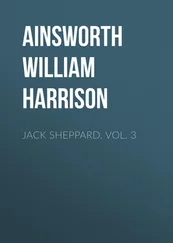W. Ainsworth - Rookwood
Здесь есть возможность читать онлайн «W. Ainsworth - Rookwood» весь текст электронной книги совершенно бесплатно (целиком полную версию без сокращений). В некоторых случаях можно слушать аудио, скачать через торрент в формате fb2 и присутствует краткое содержание. Жанр: Старинная литература, на русском языке. Описание произведения, (предисловие) а так же отзывы посетителей доступны на портале библиотеки ЛибКат.
- Название:Rookwood
- Автор:
- Жанр:
- Год:неизвестен
- ISBN:нет данных
- Рейтинг книги:4 / 5. Голосов: 1
-
Избранное:Добавить в избранное
- Отзывы:
-
Ваша оценка:
- 80
- 1
- 2
- 3
- 4
- 5
Rookwood: краткое содержание, описание и аннотация
Предлагаем к чтению аннотацию, описание, краткое содержание или предисловие (зависит от того, что написал сам автор книги «Rookwood»). Если вы не нашли необходимую информацию о книге — напишите в комментариях, мы постараемся отыскать её.
Rookwood — читать онлайн бесплатно полную книгу (весь текст) целиком
Ниже представлен текст книги, разбитый по страницам. Система сохранения места последней прочитанной страницы, позволяет с удобством читать онлайн бесплатно книгу «Rookwood», без необходимости каждый раз заново искать на чём Вы остановились. Поставьте закладку, и сможете в любой момент перейти на страницу, на которой закончили чтение.
Интервал:
Закладка:
"Not now," replied Lady Rookwood, checking the volubility of the man of law. "I thank you, Mr. Coates, for the service you have rendered me; you will now add materially to the obligation by removing the prisoner with all convenient despatch."
"Certainly, if your ladyship wishes it. Shall I detain him a close prisoner in the hall for the night, or remove him at once to the lock-up house in the village?"
"Where you please, so you do it quickly," replied Lady Rookwood, noticing, with great uneasiness, the agitated manner of her son, and apprehensive lest, in the presence of so many witnesses, he might say or do something prejudicial to their interests. Nor were her fears groundless. As Coates was about to return to the prisoner, he was arrested by the voice of Ranulph, commanding him to stay.
"Mr. Coates," said he, "however appearances may be against this man, he is no robber—you must, therefore, release him."
"Eh day, what's that? release him, Sir Ranulph?"
"Yes, sir; I tell you he came here neither with the intent to rob nor to offer violence."
"That is false, Ranulph," replied Lady Rookwood. "I was dragged hither by him, at the peril of my life. He is Mr. Coates's prisoner on another charge."
"Unquestionably, your ladyship is perfectly right; I have a warrant against him for assaulting Hugh Badger, the keeper, and for other misdemeanours."
"I will myself be responsible for his appearance to that charge," replied Ranulph. "Now, sir, at once release him."
"At your peril!" exclaimed Lady Rookwood.
"Well, really," muttered the astonished attorney, "this is the most perplexing proceeding I ever witnessed."
"Ranulph," said Lady Rookwood, sternly, to her son, "beware how you thwart me!"
"Yes, Sir Ranulph, let me venture to advise you, as a friend, not to thwart her ladyship," whispered the attorney; "indeed, she is in the right." But, seeing his advice unheeded, Coates withdrew to a little distance.
"I will not see injustice done to my father's son," replied Ranulph, in a low tone. "Why would you detain him?"
"Why?" returned she, "our safety demands it—our honour."
"Our honour demands his instant liberation; each moment he remains in those bonds sullies its purity. I will free him myself from his fetters."
"And brave my curse, foolish boy? You incurred your miserable father's anathema for a lighter cause than this. Our honour cries aloud for his destruction. Have I not been injured in the nicest point a woman can be injured? Shall I lend my name to mockery and scorn, by base acknowledgment of such deceit, or will you? Where would be my honour, then, stripped of my fair estates—my son—myself—beggars—dependent on the bounty of an upstart? Does honour ask you to bear this? It is a phantom sense of honour, unsubstantial as your father's shade, of which you just now spoke, that would prompt you to do otherwise."
"Do not evoke his awful spirit, mother," cried Ranulph, with a shudder; "do not arouse his wrath."
"Do not arouse my wrath," returned Lady Rookwood. "I am the more to be feared. Think of Eleanor Mowbray; the bar between your nuptials is removed. Would you raise up a greater impediment?"
"Enough, mother, more than enough. You have decided, though not convinced me. Detain him within the house, if you will, until the morrow; in the meantime, I will consider over my line of conduct."
"Is this, then, your resolve?"
"It is. Mr. Coates," said Ranulph, calling the attorney, who had been an inquisitive spectator, though, luckily, not an auditor of this interview, "unbind the prisoner, and bring him hither."
"Is it your ladyship's pleasure?" asked Mr. Coates, who regretted exceedingly that he could not please both parties.
Lady Rookwood signified her assent by a slight gesture in the affirmative.
"Your bidding shall be done, Sir Ranulph," said Coates, bowing and departing.
"Sir Ranulph!" echoed Lady Rookwood, with strong emphasis; "marked you that?"
"Body o' me," muttered the attorney, "this is the most extraordinary family to be sure. Make way, gentlemen, if you please," added he, pushing through the crowd, towards the prisoner.
Having described what took place between Lady Rookwood and her son in one part of the room, we must now briefly narrate some incidental occurrences in the other. The alarm of a robber having been taken, spread with great celerity through the house, and almost all its inmates rushed into the room, including Doctor Small, Titus Tyreonnel, and Jack Palmer.
"Odsbodikins! are you there, honey?" said Titus, who discovered his ally; "the bird's caught, you see."
"Caught be d—d," replied Jack, bluffly; "so I see; all his own fault; infernal folly to come here, at such a time as this. However, it can't be helped now; he must make the best of it. And as to that sneaking, gimlet-eyed, parchment-skinned quill-driver, if I don't serve him out for his officiousness, one of these days, my name's not Jack Palmer."
"Och! cushlamaeree! did I ever; why, what the devil's the boy to you, Jack? Fair play's a jewel, and surely Mr. Coates only did his duty. I'm sorry he's captured, for his relationship to Sir Piers, and because I think he'll be tucked up for his pains; and, moreover, I could forgive the poaching; but as to the breaking into a house, on such an occasion as this, och! it's a plaguey bad look. I'm afraid he's worse than I thought him."
A group of the tenantry, many of whom were in a state of intoxication, had, in the meantime, formed themselves round the prisoner. Whatever might be the nature of his thoughts, no apprehension was visible in Luke's countenance. He stood erect amidst the assemblage, his tall form towering above them all, and his eyes fixed upon the movements of Lady Rookwood and her son. He had perceived the anguish of the latter, and the vehemence of the former, attributing both to their real causes. The taunts and jeers, threats and insolent enquiries, of the hinds who thronged round him, passed unheeded; yet one voice in his ear, sharp as the sting of a serpent, made him start. It was that of the sexton.
"You have done well," said Peter, "have you not? Your fetters are, I hope, to your liking. Well! a wilful man must have his own way, and perhaps the next time you will be content to follow my advice. You must now free yourself, the best way you can, from these Moabites, and I promise you it will be no easy matter. Ha! ha!"
Peter withdrew into the crowd; and Luke, vainly endeavouring to discover his retreating figure, caught the eye of Jack Palmer fixed upon himself, with a peculiar and very significant expression.
At this moment Mr. Coates made his appearance.
"Bring forward the prisoner," said the man of law to his two assistants; and Luke was accordingly hurried along, Mr. Coates using his best efforts to keep back the crowd. It was during the pressure that Luke heard a voice whisper in his ear, "Never fear, all's right"; and turning his head he became aware of the propinquity of Jack Palmer. The latter elevated his eyebrows with a gesture of silence, and Luke passed on as if nothing had occurred. He was presently confronted with Lady Rookwood and her son; and, notwithstanding the efforts of Mr. Coates, seconded by some few others, the crowd grew dense around them.
"Remove his fetters," said Ranulph. And his manacles were removed.
"You will consent to remain here a prisoner until tomorrow."
"I consent to nothing," replied Luke; "I am in your hands."
"He does not deserve your clemency, Sir Ranulph," interposed Coates.
"Let him take his own course," said Lady Rookwood; "he will reap the benefit of it anon."
"Will you pledge yourself not to depart?" asked Ranulph.
"Of course," cried the attorney; "to be sure he will. Ha, ha!"
"No," returned Luke haughtily, "I will not—and you will detain me at your proper peril."
Читать дальшеИнтервал:
Закладка:
Похожие книги на «Rookwood»
Представляем Вашему вниманию похожие книги на «Rookwood» списком для выбора. Мы отобрали схожую по названию и смыслу литературу в надежде предоставить читателям больше вариантов отыскать новые, интересные, ещё непрочитанные произведения.
Обсуждение, отзывы о книге «Rookwood» и просто собственные мнения читателей. Оставьте ваши комментарии, напишите, что Вы думаете о произведении, его смысле или главных героях. Укажите что конкретно понравилось, а что нет, и почему Вы так считаете.












